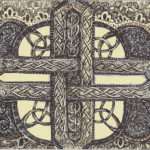We run our website the way we wished the whole internet worked: we provide high quality original content with no ads. We are funded solely by your direct support. Please consider supporting this project.

Avoiding the “S” Word: Sin
In our culture today, we don’t like to talk about sin. While most of us have a deep sense that something is off, that something is wrong with ourselves and the world, and many know or feel that they are guilty of something, this kind of talk is avoided. Instead, we evaluate ourselves by our own standards over against other people. We still have a measurement of right and wrong, but we make it up.
But the cross functions like a mirror held up before our eyes, showing us the full reality and the complete gravity of our sin.
On Christ was laid “the iniquity of us all.” “He himself bore our sins in his body on the cross” (1 Pet 2:24). God “made him to be sin who knew no sin” (2 Cor 5:21). In the crucified messiah we see the full horror of our act of violating the boundary between us and God.
In the cross, we also see the consequences of our sin. This is why Jesus was “wounded” and “crushed.” The wages of sin is death—physical as well as spiritual—and we see the death sentence carried out against all humanity on the cross (Rom 6:23).
While we prefer to avoid talking about sin, opting instead to set up our own measurements of good and evil, by doing so we are actually reinforcing the core sin from which we need to be freed. We get false worth through our sinful judgments of self and others as we use a false standard. Instead of seeing the true standard, we live as though we can make up the standards of good and evil.
But God himself is the standard. He wants nothing less than perfect union with himself, for this is the purpose for which God created the world. Anything that disrupts this union misses the mark, which is the definition of sin (harmartia).
Every act and every thought that does not flow out of trust (faith) that God is who he reveals himself to be—everything that is inconsistent with the purpose for which God created the world—misses the mark; it is sin.
The standard is perfection, as God is perfect (Matt 5:48). Everything we do, think, or say that is not perfectly consistent with the character of God condemns us. Whenever we fail to love God with all our heart, mind, and body, we stand condemned. Whenever we judge others instead of loving them as God has loved us, we stand condemned.
While we my develop our own standards by which we judge others, and some religious groups do this by coming down on certain sins that they happen to avoid while minimizing or ignoring the sins they routinely commit, the cross forces us to see something much more severe. We all stand equally condemned.
This is harsh reality and while it might not be popular, it’s true nonetheless. And it’s a truth that sets us free.
Only by becoming hopeless about our ability to live in perfect union with God on our own efforts can we begin to recover perfect union with God by simply being who God created us and died for us to be. Only by accepting that the gulf between us and God is unbridgeable through our own efforts can we stop trying to live up to some human-made standard through which we judge God, ourselves and others. And then we can simply accept the union God has sacrificially established with us in Christ.
The unsurpassable severity of our condemnation in Christ frees us to live in the unsurpassable love God has for us in Christ. The cursed tree on which Christ hung destroys the forbidden tree from which we ate.
—Adapted from Repenting of Religion, pages 150-154
Photo credit: jaci XIII via Visualhunt / CC BY-NC-SA
Related Reading

Sin-Bearing God
On the cross, God became our sin, as Paul wrote: “God made him who had no sin to be sin for us” (2 Cor 5:21). However, God didn’t begin to be a sin-bearing God when Jesus walked the earth and hung on the cross. Rather he became Incarnate and bore our sins on the cross…

Cruciform Aikido Pt 3: The Judge Who Lets Them Have It
We ended our last post noting that in the cross God ingeniously turned evil back on itself and triumphed over it. But what does all this teach us about the nature of divine judgment? Two things. First, as the one who bore our sin, Jesus experienced the judgment we deserved when the Father withdrew himself and…

What Jesus Revealed About Being Human
According to the creation story, when Adam and Eve ate the fruit, they essentially ceased being the wonderful, God-centered, God-dependent human beings the Creator intended them to be. They became less than fully human. Instead, they began using everything and everyone in the world as surrogate gods, trying to get from people, deeds, and things…

The Cross and The Trinity
Out of love for humankind, Scripture tells us, Jesus emptied himself of his divine prerogatives, set aside the glory he had with the Father from before the foundation of the world, became a human being and bore our sin as he died a God-forsaken death on Calvary (Phil 2:5-7). Though Jesus remained fully God, he…

6 Things the Church Fathers Can Teach Us about Spiritual Warfare
Image by Christina Saint Marche via Flickr Unlike our thinking today about the source of good and evil in the world, the early church fathers, including Irenaus, Athenagorus, Origen, and others before Augustine, possessed a warfare worldview. Here are 6 ideas that are common in their writings: The Reality of the “World-in-Between” The church fathers assumed…

Podcast: Are Our Personal Afflictions the Result of Our Personal Sins?
Greg considers the cause of our afflictions, the healing at Bethesda, and Monty Python. http://traffic.libsyn.com/askgregboyd/Episode_0086.mp3
